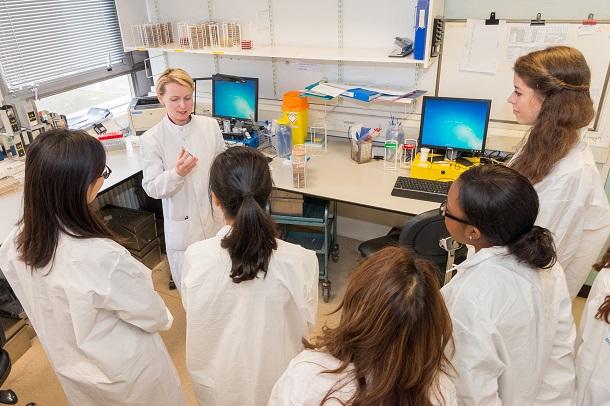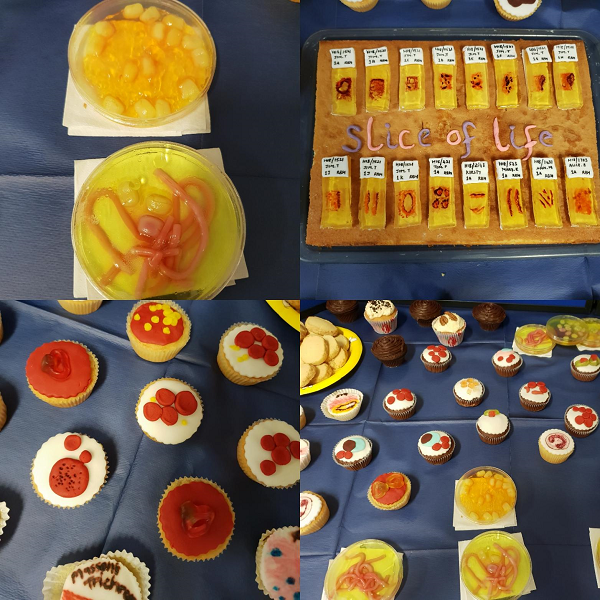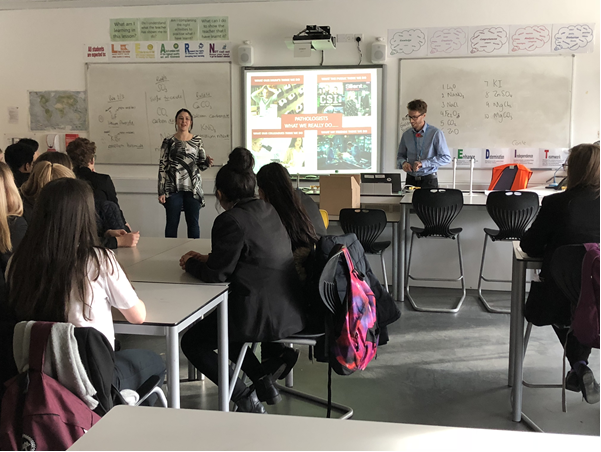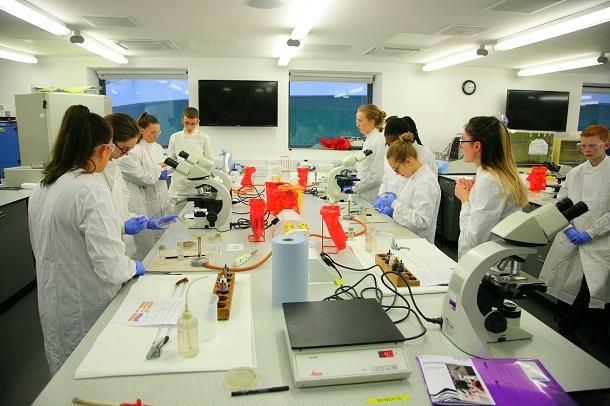College members ran a huge number of diverse events all over the UK and beyond for NPW 2018. To round off the year we’ve collected together some members’ own stories about their NPW experience. Some of the events were funded by our Public Engagement Innovation Grant Scheme, which runs annually. In all cases a huge amount of creativity, team work and dedication has clearly gone into creating some really inspiring engagement with pathology.
Pathology in the NHS: Diagnosis in action, Exeter

Our project, funded by the RCPath’s public engagement grant scheme, focused on enlightening students, patients and the public on how pathology is relevant to various aspects of their own lives.
Members of the public, students and patients at the Royal Devon and Exeter Hospital (RD&E) and at St Luke’s campus had the opportunity to engage with activities such as comparing histological pancreatic tissue in health with cancerous pancreatic tissue using microscopes at our stand. One comment we received was “Volunteering was a great experience as I was able to use my current knowledge and apply it to real world scenarios. It was rewarding to inform other people about issues such as diabetes, how to use and analyse dipstick urine tests and discuss elements of microbiology i.e. gram negative and positive bacteria.” Volunteers also loved teaching students at schools within Exeter about aspects of pathology including IVF and ‘test tube babies’.
Students took part in microbiology laboratory workshops which involved a laboratory tour, showcasing the different work that microbiologists do in the laboratories, including the chance to use the microscopes in the laboratory. Students also got involved in a gram staining practical! The clinical chemistry laboratory tours enabled the students to gain an understanding of the key steps towards a diagnosis. It was really exciting for students to see the work that happens in a laboratory and get involved in the action! Some students were certainly surprised by the many steps that need to be taken before a diagnosis is reached.
Taona Nyamapfene, president of the Exeter Medical Leadership and Management Student Society
Pat(h)isserie 2018, Reading

There’s nothing more celebratory than the aroma of freshly baked goods. The Berkshire and Surrey Pathology Services (a network of 5 main hospital sites) kick started the pathology week with a lab themed bake off competition. It was heart-warming to see such enthusiastic participants across the biomedical sciences come together to showcase their work.
There were some brilliant work themed ideas which materialised into completely edible products, some too amazing to tuck into but lucrative enough to fill the charity coffers.
Displayed outside the eating HUB at the Royal Berkshire Hospital , the goodies caught the attention of many visitors and hospital staff many of whom had little idea about the goings on within the lab. The curiosity and interest generated was motivating and one could sense the solidarity and pride felt among our staff as we showcased our ‘work behind the scenes’.
The joint winners were a technically-precise IMF themed cake by the immunology department at Ashford and St Peter’s Hospital and a cake by the department of Cellular Pathology at the Royal Berkshire Hospital - ‘Slice of Life’, freshly embedded and cover slipped for reporting!
The money raised from the contributions will be donated to The Harvey’s Gang, a non-profit organisation that helps unwell children overcome their fear of hospitals by holding lab tours for young people so they can better understand their condition.
Dr Ankurita Kuppasad, Histopathology registrar, Royal Berkshire Hospital.
Careers quiz, Oxford

In celebration of National Pathology Week, as a husband and wife pathology dream team, Phil (ST4 at Imperial) and I went to give talks at a secondary school in Oxford – The Oxford Academy. The aim was to promote Pathology and the different careers within it.
We took the approach of a quiz, asking them questions with challenged the preconceptions they might have had of pathologists (largely due to TV). For example, “are pathologists doctors?”, “Do pathologists work with the living or the dead?”, “Who do pathologists work for? The police, hospitals or The Queen?” and asked for a show of hands. We then challenged their ideas of causes of death, and in particular, sudden death, and gave them a post mortem story with some obvious pathology (queue semi-gory macro photos) and asked them to guess the cause of death. We also discussed the concepts of histology, again illustrated with a story. We ended with the different careers within pathology.
In total we spoke to over 250 children from year 7 to year 12. The first two groups in the school hall with 90 kids at a time. The last three groups were of approx. 30 kids each. The response was amazing. They were so engaged. We were supposed to talk for 20 mins with 10 mins for questions, but each session the questions went on up to the full hour. The questions were really excellent from kid’s so young and included:
• “Do you need consent to do an autopsy?”
• “If you can’t find a cause of death, how long do you keep on looking?”
• “Do you have to pay to have an autopsy done?”
• “Do you do autopsies on children?”
• “What happens to the tissue which you take out to look at under the microscope and then are finished with it?”
And the list goes on…
Really worthwhile and some smart budding pathologists/ BMS’ / APTs out there!
Dr Phillip Brown. ST4 histopathology trainee at Imperial College Healthcare NHS Trust and Dr Alex Roche, ST2 histopathology trainee at Buckinghamshire Healthcare NHS Trust.
Science Secrets of the Hospital Lab, Aberdeen

School pupils from across the north-east travelled to Robert Gordon University (RGU) for a series of scientific sessions as part of National Pathology Week 2018.
Local secondary school pupils from S4 and S5 spent Wednesday afternoon at the university’s Sir Ian Wood Building, taking part in a range of experiments as they worked to solve a clinical scenario.
Organised by Rebecca Wright, lecturer in the School of Pharmacy and Life Sciences, and funded by the RCPath public engagement grant, each workshop took place in RGU’s state-of-the-art laboratories and allowed the pupils to experience different aspects of pathology, including histology, microbiology, haematology and blood transfusion.
Titled ‘Science Secrets of the Hospital Lab’, the event welcomed young scientists from secondary schools across the north-east, including International School Aberdeen, Albyn School, Robert Gordon’s College, Lossiemouth High school Cults Academy, Alford Academy, Inverurie Academy, and Mearns Academy.
The idea behind the workshops was not only for the pupils to have fun, but to give them an idea of what it would be like to study and work in this field. Rebecca and team were proud to take a leading role in engaging with the community and demonstrating the exciting possibilities that science provides.
One young aspiring scientist, who took part, said: “Pathology is a very interesting topic which has many different aspects to it.”
We put out a post-event press release entitled ‘Young scientists of the future experiment at RGU’ and our local paper reported on our NPW event.
Rebecca Wright, HCPC Biomedical Scientist and lecturer at Robert Gordon University.
Thank you and well done to all our members and supporters who organised something for National Pathology Week 2018. Save the date for NPW 2019 - 4 – 10 November - and get in touch if you have any questions or ideas - it is never too early to start planning!

